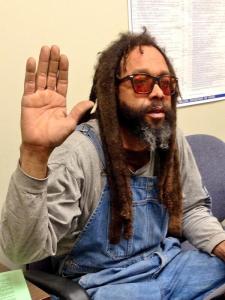Voting officials scoff at a recount, so citizen groups take action

By Carlo Maffatt | Watchdog.org
LAS VEGAS — Your next representative in Congress could end up being, well, somebody like Mike Monroe, if something isn’t done about the electoral system, critics say.
Fed up with voting machine discrepancies, some folks are taking matters into their own hands and are organizing grassroots efforts to reduce voter fraud and electoral errors.
WHO IS MIKE MONROE? Unknown candidate capture 22 percent of the votes, causing many to lose confidence in the electoral voting system.
Citizen Task Force for Voting Rights is trying to tackle the vulnerabilities by alerting and educating voters to call in any irregularities with voting machines and election systems to their election fraud hotline.
Retired Air Force Col. Robert E. Frank, chairman and founding member of CTFVR, said he wants to make voters more aware of the system’s glitches and inspire them to demand independent audits.
The group’s impetus for action came last June when Monroe, a virtual unknown in the highly competitive race for Congress, made Nevada history taking 22 percent of the vote in the GOP primary for the immense 4th Congressional District, which covers northern Clark County and six rural counties.
A computer glitch has been suspected, though no wrong-doing was discovered, displacing popular candidate Niger Innis, who had a 10-point polling lead, and handing the party’s nomination to state Rep. Cresent Hardy. Innis is the spokesman for the civil-rights group Congress of Racial Equality, or CORE.
The Las Vegas Review Journal reported that Innis asked Secretary of State Ross Miller to investigate the incident. But Innis was told no investigation could be initiated unless he could provide evidence of a computer flaw. He also would have had to pay a $40,000-per-candidate fee. That money would have to come from other sources since state law prohibits using campaign funds for ballot recounts.
Both Innis and Hardy spent around $150,000 during the campaign, while Monroe, a handyman and construction worker, didn’t campaign, raise or spend any money, debate, go door-to-door or give any media interviews. Few had ever even seen a photo of him.
In spite of his laissez faire approach, Monroe won Esmeralda County, among others, with 40 of the 100 registered votes.
To give it perspective, rural Esmeralda County historically has been a active in Republican politics, especially primaries. Innis was the big favorite there.
Resident Roderick Myers succinctly sums it up: “It is impossible to happen here.”
“We all know people here vote for Niger or Cresent. Nobody here has even heard of Mike Monroe. We tried to locate the 100 (registered) voters, but could only find 14, and none of them knew who Mike Monroe was. All gave their votes to Niger or Cresent.”
In recent years, confidence in the electoral system has declined dramatically. A survey by the polling firm Rasmussen revealed only 40 percent of American voters surveyed have confidence in the electoral process and consider elections to be fair, compared to 57 percent in 2012. The survey of 1,000 likely voters was conducted on Oct. 13-14 by Rasmussen Reports. The margin of error is plus or minus 3 percentage points.
Critics say the electoral systems in most states are designed to cover up mistakes.
Esmeralda County Clerk and Treasurer LaCinda Elgan said their auditing was “fully consistent and that no errors where detected.”
But Citizen Task Force’s founder Frank disagreed.
“We decided to get involved because we saw no evidence of the government auditing itself. They have a poor record of doing so.,” Frank said. “After clear evidence of possible computer errors they have done nothing.”







